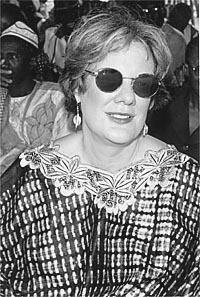
RPCV Molly Melching works for end of Female Genital Mutilation in Senegal
Changing a painful practice
By Chris Bergeron / CNC Staff Writer
Thursday, February 5, 2004
Senegalese woman brings fight against female circumcision to U.S.
Leaving her African homeland for the first time, Kerthio Diara is bringing her campaign to end the painful practice of female circumcision to the U.S. Congress.
The 43-year-old native of Senegal, who underwent the traditional practice also known as genital mutilation as a teenager, is traveling to Washington, D.C., this week to publicize a grass-roots effort to promote human rights among African women.
Diara said young girls in her predominantly Muslim village had their genitals cut for centuries as part of a ceremony associated with their passage into womanhood.
Young Senegalese boys also undergo circumcision in a different procedure that does not prevent them from enjoying sex.
Speaking through a translator, Diara emphasized the practice was a very old social "tradition" and "absolutely" not required by her Islamic faith.
"It hurt terribly," Diara said through translator Molly Melching, a former Peace Corps volunteer fluent in the Wolof language. "It was very painful."
On her first trip abroad Diara is traveling with Melching, who has lived for 30 years in Senegal. Melching is executive director of "Tostan," a nonprofit agency that provides training in literacy, public health and community development in Senegal.
According to an Amnesty International report, the practice of female genital mutilation, or FGM, is often a necessary step for young women in some societies to affirm their social identities or enter womanhood.
Some societies regard the procedure as a way to inhibit female sexuality. According to Amnesty International, the practice often limits or eliminates sexual pleasure.
Diara said she couldn't say whether FGM lessened sexual pleasure because she underwent the procedure before she married and had nothing to compare her present condition to.
Due to the strong social pressure to conform with an ancient though painful tradition, Diara said, "I was looking forward to it."
She recalled at least one other girl, who belonged to a social group in her village that did not typically undergo the procedure, volunteered to be "cut."
Diara said people in her village never used to question or challenge the practice of genital cutting due to the weight of tradition.
"It had been done to our parents and grandparents. It always existed. It was just expected," she said.
As often happens in other countries, a villager with no medical training performed the procedure without anesthesia using an unsterilized cutting instrument. In Diara's village, a person who worked as a blacksmith cut the girls.
"If you don't get cut, you're scorned. You don't get married," added Melching. "It's like driving on the right side of the road in some countries; it's something that's always been done. It wasn't questioned."
After her marriage, Diara had her three daughters "cut" in keeping with local traditions. One nearly bled to death, she said.
Diara will meet U.S. Sen. Dick Durbin, D-Ill., and the Washington, D.C., press corps on Feb. 6, a date designated by several agencies to promote "End Female Genital Cutting Day."
Believed to have originated in Egypt thousands of years ago, female genital mutilation involves the surgical removal of some or all of the external female genital organs for cultural or non-medical reasons.
The physical damage done by FGM is lifelong and not reversible.
It still occurs in 26 of Africa's 43 nations, especially in Egypt and Somalia, affecting several million young girls, according to data provided by Nicolene Hengen, of Wellesley Centers for Women, in association with Wellesley College.
Diara's visit to the U.S. precedes the Wellesley Centers for Women's 2004 International Research and Action Conference April 25-28.
The three-day event will address "Innovations in Understanding Violence Against Women" from an international perspective.
It will include speakers, roundtable discussions and presentation of research papers, Hengen said.
Some of the presentations will concern:
(Domestic violence as a human rights violation
(Violence against women with disabilities
(Marital rape and HIV/AIDS
(Family violence in Asian families
During an interview Monday at the Wellesley Centers for Women, Diara wore traditional Senegalese clothes, including a head scarf known as a "musoor" and a blue tunic, or "nodoket."
Founded in 1982 by Melching and others, "Tostan," which means "Breakthrough" in the Wolof language, uses a mixture of traditional and modern teaching practices to help Africans improve their lives.
Melching emphasized the agency is not trying to impose values or destroy valued traditions but, instead, wants to help Senegalese men and women work together to respect human rights while changing society.
While Senegal made FGM illegal, Diara said through Melching "the law hasn't worked."
"People hide it," she said. "It's gone underground."
Diara said Tostan's educational programs have convinced large numbers of Senegalese to abandon the practice of FGM because they're now aware of the health and emotional problems it causes.
Since joining Tostan, Diara and other women from her area publicly called for the ending of FGM. Over the last several years, more than 1,200 villages in Senegal, totaling 600,000 people, have formally declared an end to the practice.
One of Senegal's leading Islamic leaders has called upon Muslims there to end FGM countrywide by 2010.
A married mother of eight children, Diara helps support her family by selling soap and making clothes.
Though she'd never traveled outside her country, she said she's glad to visit the United States to help end a painful and unhealthy practice.
"I never dreamed I'd leave my village and come to America," Diara said. "But I'm happy to explain what has happened so more children won't be hurt."
For information on the Wellesley Centers for Women's April conference on Understanding Violence Against Women, visit the Web site www.wcwonline.org/conference.
